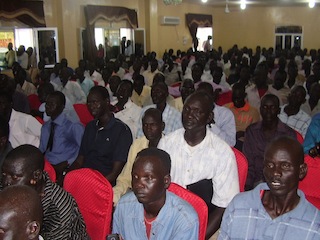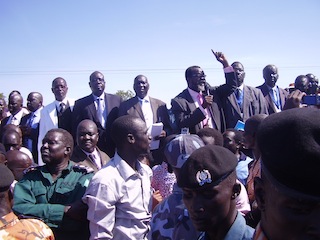Elders seek removal of N. Bahr el Ghazal governor
March 16, 2013 (JUBA) – Elders and prominent political figures from South Sudan’s Greater Bahr el Ghazal region have thrown their support behind calls for the removal of Northern Bahr el Ghazal State governor, Paul Malong Awan.

Community members argue that Awan’s behaviour was becoming “an obstacle” to community unity, raising fears that such divisions would “undermine popularity” and support for the ruling party – the Sudan People’s Liberation Movement (SPLM).
The elders made the statements at a community conference in Juba to discuss solutions to political differences in Northern Bahr el Ghazal, where some groups warned South Sudan’s president Salva Kiir that he must choose between giving his support to the governor or having their cooperation.
“Let there be no any confusion. It must be clear that the people of Mading Aweil have [the] ultimate say in running and managing their own affairs and the president must make a choice between working with [governor Paul] Malong Awan and the community. The president should decide either to accept working with Malong Awan as [an] individual or accept working with the community”, former state advisor on peace and reconciliation Samayo Adut told the audience of elders and politicians.
South Sudan’s deputy speaker, Daniel Awet Akot, told the conference that he respects and supports the decision of the people of Northern Bahr el Ghazal to voice their grievances, including the demand to remove the state governor.
He gave the example of when he stepped down as governor of Lakes state.
“You know that I was a governor in Lakes state and I respected their choice when they did not want me to remain there. I simply left and went to my area to contest a parliamentary seat which brought me to the National Assembly”.
The MP suggested that Awan “should do the same thing. He should go and wait for elections. If people elect him in the next election, then he comes to Juba and if he has capabilities, the president will give him another assignment somewhere else”, Akot told the audience.
South Sudan’s deputy speaker said that he would work hard to help resolve the community’s grievances, urging the people of Northern Bahr el Ghazal to remain peaceful and supportive of SPLM activities.
Other leaders from Northern Bahr el Ghazal also spoke of political problems in the border state, including Ambrose Riiny Thiik, the former president of the Supreme Court of Southern Sudan. The state was an autonomous region of Sudan during the six-year period following the 2005 peace deal that led to South Sudan’s independence in 2011.
Thiik said while significant problems remained in Northern Bahr el Ghazal, he had been reluctant to give support to those raising such issues before the grievances were formally brought to the attention of elders and the government.
“We know there is a big problem in Aweil but we did want to be seen as supporting one side because it could be [like supporting] individual grudges. We did not want to be seen as against Malong Awan. We wanted [the] community to talk themselves like this. We will now stand with you. We will support what you want. We have seen how people have spoken. These are being recorded. There are videos. The journalists are doing their work. We will take this to the president and what you have said as it is”, said Thiik.
Aldo Ajou Deng Akuey, a former deputy prime minister in Sudan in the 1980s and now chairperson of the human rights and legal affairs committee in the Council of States, accused Awan of having divided Northern Bahr el Ghazal, resulting in politicians and intellectuals deserting the state.
“There can never be unity when Malong is still a governor. He is the cause of all these divisions. He divided all the people and created camps”, Akuey told the conference. He also accused the governor of “not respecting [the] constitution”.

“We have no problem amongst ourselves, the problem is in Warrap. They are the ones who have taken more seats and gave us only two positions in the national government. They took more than they would have deserved if fair distribution and allocation of power was exercised. This is what we should be saying”, Akol told the gathering in a short speech.
Dhieu Mathok Diing Wol, chairperson of the Employees Justice Chamber, said Northern Bahr el Ghazal does not belong to Awan and criticised him for dismissing six SPLM MPs from state parliament last year.
Kiir’s office recently ordered Awan to reinstate the MPs on the recommendation of the South Sudan Council of States, which had looked into the matter.
“The state does not belong to him alone. We will go with those who have been reinstated to see who will say what. This is unconstitutional”, Wol told the audience at the conference.
In a letter bearing the signature of SPLM’s deputy secretary-general Anne Itto and dated 2 July 2012, the six MPs were accused of collaborating with members from other political parties in the house in order to undermine activities of the party. Other charges include accusations of disloyalty and lack of adherence to party directives, allegations which the members have repeatedly denied and challenged the authorities to produce evidence.
Last June, Awan issued an executive order removing speaker Aguer Wol Aguer, claiming he was responding to demands by the majority of MPs for Aguer to resign as instructed by the SPLM. Awan said his intervention to remove the speaker was to “preserve unity” in the party.
But, the Council of States rejected the decision, describing it as unconstitutional and passed a resolution reinstating Aguer as the legitimate speaker. The upper house of South Sudan’s parliament sought the approval of the president who, in February, issued a directive asking Awan to implement the decision of the house without preconditions. Kiir also asked Awan to call for political convention in the state.
The speaker of the Council of States, Joseph Bol Chan, on Saturday accused Awan of encroachment into the competence of another institution, saying his actions were in clear violation of the constitution.
“We have a big problem in this country. We have people who do not respect [the] constitution. They act as if they are above the law. The constitution is the supreme law of the land anywhere. It provides a system of checks and balances by its design. In our constitution, we have a decentralised system composed of three independent branches: executive branch, legislative branch and the judiciary. In practice, each holds separate but equal powers which prevent any single branch from exercising an unwarranted amount of influence over the operation and function of the other”, Chan explained.
“The governor has no right to remove the speaker in this case. This was why the council reinstated the speaker and the six members to their positions”, he added.
The Greater Bahr el Ghazal conference, involving Northern Bahr el Ghazal, Western Bahr el Ghazal, Warrap and Lakes state, was expected to conclude its deliberations on Sunday.
(ST)
